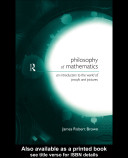The Mathematical Image
The proof is elegant and the result profound. Still, it is typical mathematics; so, it’s a good example to reflect upon. In doing so, we will begin to see the elements of the mathematical image, the standard conception of what mathematics is. Let’s begin a list of some commonly accepted aspects. By ‘commonly accepted’ I mean that they would be accepted by most working mathematicians, by most educated people, and probably by most philosophers of mathematics, as well. In listing them as part of the common mathematical image we need not endorse them. Later we may even come to reject some of them – I certainly will.With this caution in mind, let’s begin to outline the standard conception of mathematics.
Certainty The theorem proving the infinitude of primes seems established beyond a doubt. The natural sciences can’t give us anything like this. In spite of its wonderful accomplishments, Newtonian physics has been overturned in favour of quantum mechanics and relativity. And no one today would bet too heavily on the longevity of current theories. Mathematics, by contrast, seems the one and only place where we humans can be absolutely sure we got it right.
Objectivity Whoever first thought of this theorem and its proof made a great discovery. There are other things we might be certain of, but they aren’t discoveries: ‘Bishops move diagonally.’ This is a chess rule; it wasn’t discovered; it was invented. It is certain, but its certainty stems from our resolution to play the game of chess that way. Another way of describing the situation is by saying that our theorem is an objective truth, not a convention. Yet a third way of making the same point is by saying that Martian mathematics is like ours, while their games might be quite different.
Proof is essential With a proof, the result is certain; without it, belief should be suspended. That might be putting it a bit too strongly. Sometimes mathematicians believe mathematical propositions even though they lack a proof. Perhaps we should say that without a proof a mathematical proposition is not justified and should not be used to derive other mathematical propositions. Goldbach’s conjecture is an example. It says that every even number is the sum of two primes. And there is lots of evidence for it, e.g. 4 = 2 2, 6 = 3 3, 8 = 3 5, 10 = 5 5, 12 = 7 5, and so on. It’s been checked into the billions without a counter-example. Biologists don’t hesitate to conclude that all ravens are black based on this sort of evidence; but mathematicians (while they might believe that Goldbach’s conjecture is true) won’t call it a theorem and won’t use it to establish other theorems – not without a proof.
Notes:
How mathematics provides certainty, objectivity,
Folksonomies: mathematics philosophy
Taxonomies:
/science/mathematics (0.706712)
/science/mathematics/arithmetic (0.476929)
/science/physics (0.278406)
Keywords:
mathematical image (0.958643 (neutral:0.000000)), standard conception (0.773153 (neutral:0.000000)), proof (0.747768 (positive:0.017671)), commonly accepted aspects (0.705034 (neutral:0.000000)), common mathematical image (0.664796 (neutral:0.000000)), mathematics (0.639708 (negative:-0.200248)), mathematical propositions (0.606409 (positive:0.250853)), good example (0.453611 (positive:0.642713)), typical mathematics (0.452129 (negative:-0.200248)), result profound (0.452061 (positive:0.725996)), theorem (0.448811 (positive:0.524133)), natural sciences (0.430097 (positive:0.560111)), Newtonian physics (0.422792 (negative:-0.350254)), Goldbach’s conjecture (0.417039 (positive:0.330113)), current theories (0.411653 (neutral:0.000000)), wonderful accomplishments (0.410526 (positive:0.535538)), quantum mechanics (0.407427 (positive:0.539488)), certainty (0.396466 (positive:0.313798)), n’t discoveries (0.389970 (neutral:0.000000)), Martian mathematics (0.389039 (neutral:0.000000)), objective truth (0.388964 (positive:0.441574)), mathematical proposition (0.388871 (negative:-0.453719)), chess rule (0.382310 (neutral:0.000000)), mathematicians (0.349005 (neutral:0.000000)), objectivity (0.278995 (positive:0.514272)), way (0.261145 (negative:-0.395362)), primes (0.248986 (neutral:0.000000)), evidence (0.205603 (positive:0.331792))
Entities:
Goldbach:Person (0.853067 (positive:0.270241))
Concepts:
Mathematics (0.957418): dbpedia | freebase | opencyc
Theorem (0.619504): dbpedia | freebase
Logic (0.610482): dbpedia | freebase | opencyc
Philosophy of mathematics (0.609815): dbpedia | freebase | yago
Mathematical proof (0.501135): dbpedia | freebase
Four color theorem (0.468168): dbpedia | freebase | yago
Pythagorean theorem (0.451740): dbpedia | freebase | yago
Truth (0.447245): dbpedia | freebase





